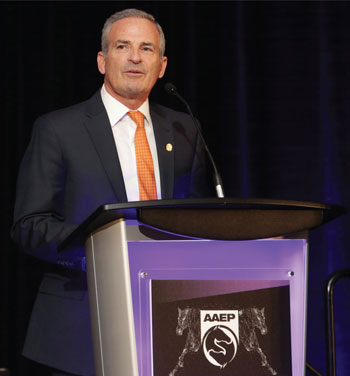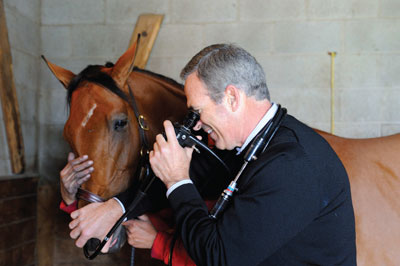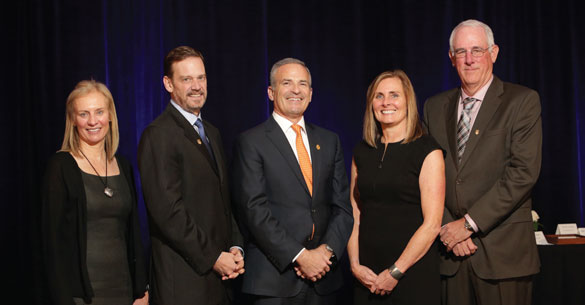Incoming AAEP president born into the business

The American Association of Equine Practitioners named Kentucky-based Dr. Jeffrey T. Berk (Pennsylvania '81), a Thoroughbred practitioner focused on domestic and international sales, as its 2019 president during the AAEP's 64th Annual Convention, Dec. 1-4, 2018, in San Francisco.
"My goal (with the AAEP) was to be involved in the organization and serve in whatever capacity I was asked to serve," he said. Dr. Berk has previously served as chair of the AAEP Foundation, AAEP treasurer, a member of the AAEP board of directors, chair of the AAEP Professional Conduct and Ethics Committee, and a member of the AAEP's Biologics and Therapeutic Agents, Convention Planning, Finance, Public Policy, and Purchase Exam committees.
Dr. Berk spoke with JAVMA News about his background, his presidency plans, and the challenges ahead for the AAEP. The following responses have been lightly edited.
Q. Tell me about yourself, did you always want to be a veterinarian?
A. My father is a veterinarian. He had a mixed animal practice in rural Connecticut, and I went on calls with him as a child. My father's veterinary clinic and our house were one building. It was not abnormal to find my dad castrating some piglets in the kitchen. One time, he was de-scenting a skunk for a client, and the scent sac broke; we had to move out of the house and live in a hotel for three days.
Being around it, I think, it just sinks in. When I went to the University of Vermont for my undergraduate degree, I did preveterinary science, and it never occurred to me to do anything else. I was always interested in being an equine practitioner.
Some of my fellow students, during veterinary school, were nervous about the job market. But I think because my father was a self-employed veterinarian, it never occurred to me to be afraid of being self-employed. So, I was confident that it was the thing to do and it would all work out fine.
Q. What was a particularly challenging event in your career?
A. In 2009, I was diagnosed with a tumor on my spinal cord that required surgery.
My legs had been feeling abnormally heavy, and it seemed to be getting increasingly worse. I went to the Mayo Clinic in Jacksonville, Florida, and they performed a battery of tests. During the MRI, the technician said that the radiologist had requested that they continue the study higher on my spine, at which time a tumor was imaged at the level of the ninth and 10th thoracic vertebrae pressing on my spinal cord.

There was no choice, it had to be taken out. Fortunately, it was benign, but after the surgery, I couldn't feel my left leg, and it took me months to learn to walk again. I was very active beforehand—running, fox hunting with my dad, and riding horses—but due to some nerve damage, I am not able to be as active.
It does impede me from certain types of equine veterinary practice as it is hard to get down underneath a horse. So, I currently work in Thoroughbred sales, which includes examining the horse, evaluating the upper airway, and reviewing the radiographs and repositories that are provided by the sales company.
Q. How did you handle that experience?
A. I think every time we are faced with the unknown, you can make your decisions based either on fear or on faith. I have a strong faith in God, and I believed that, essentially, regardless of the circumstances, everything would turn out fine, and so I placed my faith in that confidence.
Q. What issues and membership services will you focus on during your presidency?
A. The issues I will focus on are partly determined by the AAEP strategic plan as well as membership surveys that keep us focused on the needs and desires of the members.
The five goals of the strategic plan are as follows:
- Enhancing member value.
- Improving member communications.
- Providing continuing education.
- Wellness for members.
- Promoting the equine profession.
In addition, I would like to emphasize the following two areas:
- Helping to define what constitutes an appropriate level of therapeutic medication in competition horses, whether in racing, showing, sales, eventing, etc., within the current culture of overmedication.
- Helping to create a culture of ethical equine veterinary practice and encouraging young associate veterinarians and interns in ethical behavior.
Q. What are members talking about?
A. More than anything, I hear members talking about ethical issues. It seems that in every equine discipline, whenever competition and money are involved, ethical issues are present.
Q. Is membership growing, declining, or staying about the same?
A. Membership remains about the same, although we have identified an at-risk group. The AAEP loses some members up to around five years after graduation. The AAEP is currently studying this problem, which seems to occur as a result of financial pressures, a perceived lack of mentorship, and perhaps some other, as yet unidentified, factors. An AAEP working group called the Young Professionals Task Force is currently looking at the issues that younger AAEP members have that make it difficult to remain in equine practice and will be making recommendations to the board of directors in an effort to help this group.
Q. Is the AAEP facing any imminent challenges?
A. The AAEP faces many challenges. Many of them fall under the umbrella of continuing to be a respected source of information and to influence public policy in a society that is increasingly divorced from experience with and understanding of animals. A hundred years ago, people grew up with (farm) animals, and so they understood that when they were eating steak, they knew where it came from. Now, people think it comes from the refrigerator case in the grocery store with a piece of cellophane over the top of it. People are not around animals anymore unless they are small animal pets. So, it is hard for people to understand how to take care of animals that they have no experience with. Owner education is necessary, but that is not going to impact society as a whole, just select horse owners who are interested.
Other challenges include the ever-increasing debt load that veterinary students are burdened with as they begin their careers as equine practitioners, lack of available funding for much-needed equine research, and a dearth of learning experiences for students as university hospital caseloads shrink.

Q. What does the AAEP do to encourage veterinary students to consider careers in equine medicine?
A. The AAEP has an abundance of student programs designed to create an awareness of opportunities in equine veterinary medicine and educational programs exclusively for students as well as financial support in the form of scholarships through the AAEP Foundation. The Avenues Program is designed to provide students with the opportunity to participate in externships and internships with university teaching hospitals and private clinics.
Related JAVMA content:
Are horse veterinarians checking out early? (Jan. 15, 2018)
Avoiding the slippery slope of unethical behavior (Feb. 15, 2017)